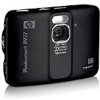HP Photosmart R930 User Guide - Page 22
Camera Setup Menu, Focus Lock
 |
View all HP Photosmart R930 manuals
Add to My Manuals
Save this manual to your list of manuals |
Page 22 highlights
Chapter 3 (continued) Exposure Compensation-Overrides the camera's automatic exposure setting. For more information, see "Exposure Compensation" on page 22. • To make the images you are about to capture brighter, touch + to increase the value. Touch OK when done. • To make the images you are about to capture darker, touch − to decrease the value. Touch OK when done. Exposure Bracketing ( only)-Creates a set of three images captured at the value set for Exposure Compensation and under- and over-exposed by the value you select. • Off (Default) • ± 0.5 • ±1.0 During Instant Review (see "Instant Review" on page 12), you can delete the entire bracketing sequence. To delete individual images, see "Deleting images" on page 25. White Balance-Balances color based on lighting conditions. For more information, see "White Balance" on page 22. • Auto (Default)-Corrects for scene illuminance. For general picture taking. • Sun-For outdoor scenes in sunny or cloudy conditions. • Shade-For outdoor scenes in shade or at dusk. • Tungsten-For indoor scenes with incandescent or halogen lighting. • Fluorescent-For indoor scenes with fluorescent lighting. ISO Speed ( only)-Adjusts the camera's sensitivity to light. For more information, see "ISO speed" on page 22. • Auto (Default)-Camera selects the best ISO speed for the scene. • ISO 100-For best quality. • ISO 200-For lower light conditions. • ISO 400-For lower light conditions and/or action when short shutter speeds are desired. • ISO 800-For increased sensitivity in low light conditions. • ISO 1600-For increased sensitivity in low light conditions. AE Metering-Specifies which region of a scene the camera uses to calculate the exposure. • Average (Default)-Useful when you want the entire scene to be used when calculating exposure. • Spot-Useful in backlit scenes or when the subject is very dark or light compared to the rest of the scene. For best results, use Focus Lock (see "Using Focus Lock" on page 13) with Spot. Camera Setup...-Displays the Camera Setup Menu for setting camera behavior (see "Using the Camera Setup Menu" on page 42). NOTE: Some options are not available in certain shooting modes or in combination with other settings. 20 Setting options for taking pictures and recording video clips















